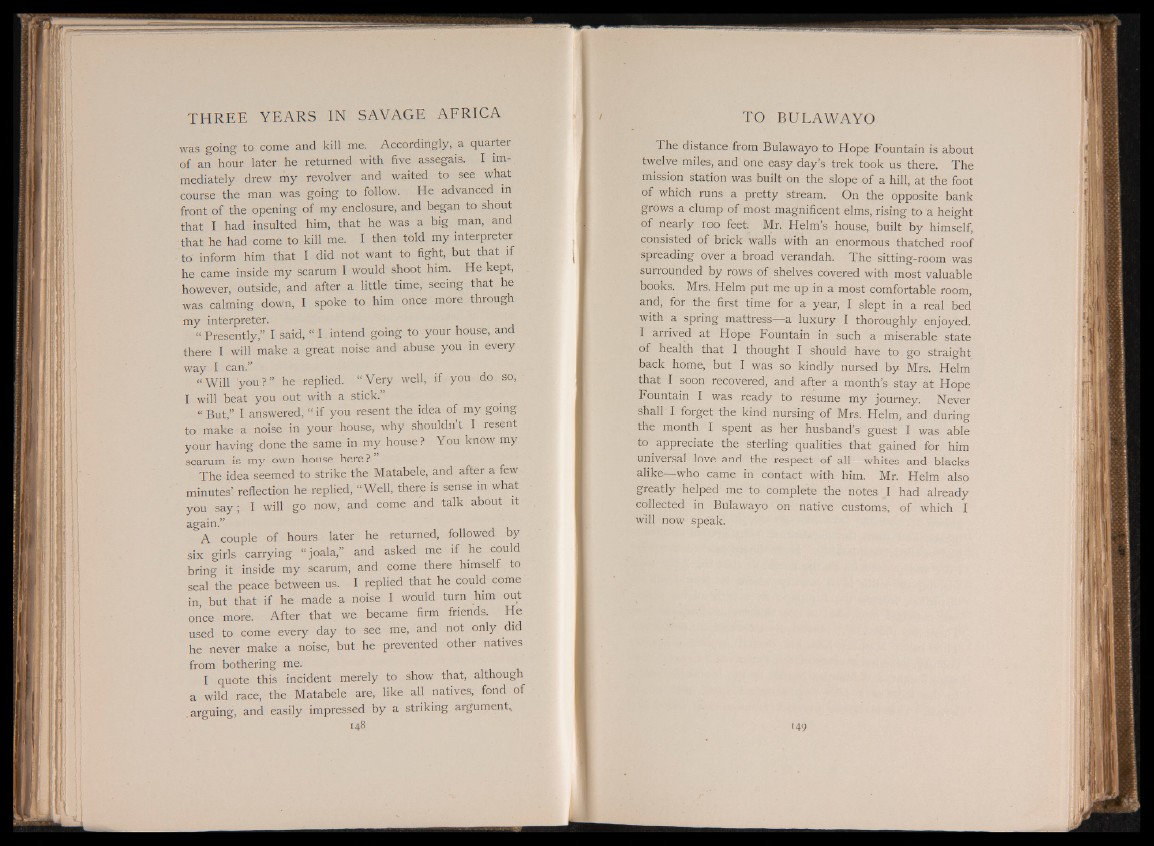
was going to come and kill me. Accordingly, a quarter
of an hour later he returned with five assegais. I immediately
drew my revolver and waited to see what
course the man was going to follow. He advanced in
front of the opening of my enclosure, and began to shout
that I had insulted him, that he was a big man, and
that he had come to kill me. I then told my interpreter
to inform him that I did not want to fight, but that if
he came inside my scarum I would shoot him. He kept,
however, outside, and after a little time, seeing that he
was calming down, I spoke to him once more through
my interpreter.
“ Presently,” I said, “ I intend going to your house, and
there I will make a great noise and abuse you in every
way I can.”
“ Will you?” he replied. “ Very well, if you do so,
I will beat you out with a stick.
“ But,” I answered, “ if you resent the idea of my going
to make a noise in your house, why shouldnt I resent
your having done the same in my house? You know my
scarum is my own house here?
The idea seemed to strike the Matabele, and after a few
minutes’ reflection he replied, “Well, there is sense in what
you sa y ; I will go now, and come and talk about it
again.”
A couple of hours later he returned, followed by
six girls carrying “ joala,” and asked me if he could
bring it inside my scarum, and come there himself to
seal the peace between us. I replied that he could come
in, but that if he made a noise I would turn him out
once more. After that we became firm friends. He
used to come every day to see me, and not only did
he never make a noise, but he prevented other natives
from bothering me.
I quote this incident merely to show that, although
a wild race, the Matabele are, like all natives, fond of
.arguing, and easily impressed by a striking argument^
The distance from Bulawayo to Hope Fountain is about
twelve miles, and one easy day’s trek took us there. The
mission station was built on the slope of a hill, at the foot
of which runs a pretty stream. On the opposite bank
grows a clump of most magnificent elms, rising to a height
of nearly 100 feet. Mr. Helm’s house, built by himself,
consisted of brick walls with an enormous thatched roof
spreading over a broad verandah. The sitting-room was
surrounded by rows of shelves covered with most valuable
books. Mrs. Helm put me up in a most comfortable room,
and, for the first time for a year, I slept in a real bed
with a spring mattress—a luxury I thoroughly enjoyed.
I arrived at Hope Fountain in such a miserable state
of health that 1 thought I should have to go straight
back home, but I was so kindly nursed by Mrs. Helm
that I soon recovered, and after a month’s stay at Hope
Fountain I was ready to resume my journey. Never
shall I forget the kind nursing of Mrs. Helm, and during
the month I spent as her husband’s guest I was able
to appreciate the sterling qualities that gained for him
universal love and the respect of all—whites and blacks
alike—who came in contact with him. Mr. Helm also
greatly helped me to complete the notes I had already
collected in Bulawayo on native customs, of which I
will now speak.